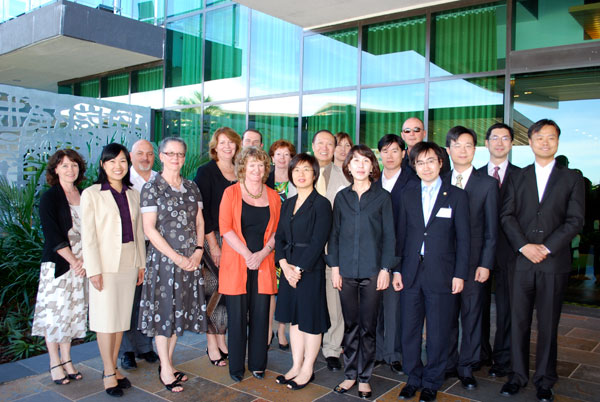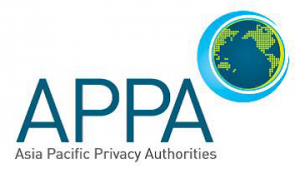33rd APPA Forum — Communiqué
The 33rd Asia Pacific Privacy Authorities (APPA) Forum was held in Darwin, Australia from 3–4 June 2010. This Communiqué outlines the initiatives discussed at this Forum.

Back row — from left: Ann-Marie Fishburn, Manager FOI & Privacy, South Australia; David Taylor, Director Privacy Awareness, Privacy Victoria; Karen Curtis, Privacy Commissioner, Australia; Adam Roach, Department of Justice & Community Safety, ACT; Zoe Marcham, Deputy Information Commissioner, Northern Territory; Roderick Woo, Privacy Commissioner, Hong Kong; Brenda Monaghan, Information Commissioner, Northern Territory; Kim Ho Seong, Korea Internet & Security Agency; Dr Colin Bennett, Visiting Professor University of NSW (guest speaker); Ken Yang, Office for Personal Data Protection, Macao; Henry Chang, Office of the Privacy Commissioner for Personal Data, Hong Kong; Yoon Kwon Il, Korea Internet & Security Agency.
Front row — from left: Hui Ling Goh, Federal Trade Commission, USA; Marie Shroff, Privacy Commissioner, New Zealand; Helen Versey, Privacy Commissioner, Victoria; Sonia Chan, Office for Personal Data Protection, Macao; Han Ji Hye, Korean Communications Commission; Yoichito Itakura, Consumer Affairs Agency, Japan.
The 33rd Asia Pacific Privacy Authorities (APPA) Forum was hosted by the Office of the Information Commissioner, Northern Territory in Darwin, Australia on 3–4 June 2010.
In attendance were representatives from privacy authorities in Australia, Hong Kong, Korea, Northern Territory, New Zealand and Victoria. Representatives from privacy-related authorities in other jurisdictions also attended as observers, including those from the USA’s Federal Trade Commission, Japan’s Consumer Affairs Agency, Korea’s Korean Communications Commission, Macao’s Office for Personal Data Protection, and the Australian states of Queensland, South Australia and the Australian Capital Territory.
Day 1
Attendees presented reports detailing recent privacy developments that have occurred within their jurisdiction including issues relating to privacy and technology. Matters raised included future privacy impacts of ubiquitous computing, cloud computing, the use of biometric data for entry into venues, and ongoing investigations. This session allowed members to discuss and exchange ideas on the issues that jurisdictions are facing.
The meeting discussed Privacy Awareness Week 2010 and agreed to continue the Week in the future. Members agreed that an overarching slogan for use by jurisdictions should be considered on a year by year basis, and that each jurisdiction should continue to have the flexibility to develop their own theme.
Members agreed with the proposed Terms of Reference of the newly formed Technology Working Group to be led by the Office of the Privacy Commissioner for Personal Data Protection, Hong Kong. Membership of the working group will be open to all APPA members and observers.
Attendees discussed progress towards the Global Privacy Enforcement Network (GPEN), the APEC Privacy Framework, the OECD’s Working Party on Information Security and Privacy, the International Conference of Data Protection and Privacy Commissioners, and the establishment of a Global Privacy Standard.
APPA members discussed broadening membership with members agreeing with the recommendations made by the APPA Membership Working Group. Members agreed that APPA is to evolve into a regional meeting of data protection authorities and privacy enforcement authorities for the entire Asia-Pacific region with members being eligible to join if they are accredited to the International Conference of Data Protection and Privacy Commissioners (ICDPPC); or a participant in the APEC Cooperation Arrangement for Cross-border Privacy Enforcement (APEC Arrangement). Members also wanted a mechanism to be found by which authorities that perform functions that are substantially similar to APPA members may be eligible to join.
Day 2
Members participated in a public forum on ‘Privacy and Society’ organised by the Office of the Information Commissioner, Northern Territory. Approximately 60 Privacy Contact Officers from across the Northern Territory Government joined. The following speakers addressed the forum:
- The Hon. Delia Lawrie, MLA, Deputy Chief Minister and Attorney-General
- The Hon. Austin Asche AC QC, retired Chief Justice
- Mr Michael Grant QC, Solicitor-General
- Dr Colin Bennett, Visiting Professor UNSW
- Ms Marie Shroff, Privacy Commissioner, New Zealand
- Mr Philip Piper, Director ICT Security, Northern Territory Government
- Ms Karen Curtis, Australian Privacy Commissioner
- Ms Helen Versey, Victorian Privacy Commissioner
- Mr Roderick Woo, Privacy Commissioner for Personal Data, Hong Kong
- Mr Mark Wood, Licensing Inspector Department of Justice, Northern Territory.
The public forum featured presentations on privacy issues and Indigenous populations from Australia, New Zealand, Canada, as well as a panel discussion on a wide variety of issues including the use of biometrics, children and privacy, changes in the privacy landscape in Hong Kong, and alcohol licensing issues in the Northern Territory. The second day of the official APPA forum opened with an address on privacy advocacy by guest speaker Dr Colin Bennett from the University of Victoria, BC, Canada.
Members discussed the use of social media platforms by privacy regulators as a communication tool, and members agreed to continue to update the meeting on progress in this area.
The privacy implications of smart infrastructure were also discussed with a variety of jurisdictions noting that this was an issue that would become more important as this type of technology continued to develop.
Next meeting
The next meeting of the Forum will be held in Auckland, New Zealand from 7–8 December 2010.
About APPA
APPA is the principal forum for privacy authorities in the Asia Pacific region to form partnerships and exchange ideas about privacy regulation, new technologies, and the management of privacy enquiries and complaints.
APPA has the principal objectives of:
- facilitating the sharing of knowledge and resources between privacy authorities within the region
- fostering cooperation in privacy and data protection
- promoting best practice among privacy authorities
- working to continuously improve performance to achieve the important objectives set out in our respective privacy laws
- jointly promoting privacy awareness activities
- working together to make contributions in international contexts
- liaising and cooperating with others.
